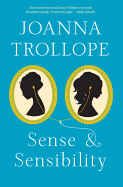
Many contemporary novelists have tried to continue the story of Pride & Prejudice, but none have quite reached the heights of the original. Joanna Trollope takes a different approach, reinterpreting Sense & Sensibility in much the same way as Baz Luhrmann's Romeo & Juliet. In appealing to modern audiences while keeping true to the spirit of Jane Austen, she largely succeeds.
Trollope's sense has the appearance of the logical and industrious, while sensibility becomes artsy, liberal-minded passion. The settings of Norland and Barton remain largely the same, but the Dashwood sisters are now smart, 21st-century versions of their Austenian counterparts, well-versed in the intricacies of social media. Less so the men: while the jovially magnanimous Sir John Middleton and the self-serving John Dashwood are exact replicas of their characters, Trollope has reduced Willoughby to a cold-hearted, two-timing Casanova and promoted veteran Bill Brandon to a love-struck do-gooder with a heart of gold, absent his darker mood swings. Edward Ferrars, whom Hugh Grant played with such bumbling aplomb in the movie, appears even more incompetent in matchmaking in Trollope's reimagining, while brother Robert receives a stereotypically gay makeover as a flamboyant interior designer.
Diehard Janeites will likely find travesty in Trollope's faithful rendition of Austen's cleverly constructed storyline; the prose is not as crisp and Trollope relies more on interior soliloquies to communicate class divides. Yet Trollope works just enough magic into her modernization to recommend readers back to Austen's masterpiece. --Nancy Powell, freelance writer and technical consultant

